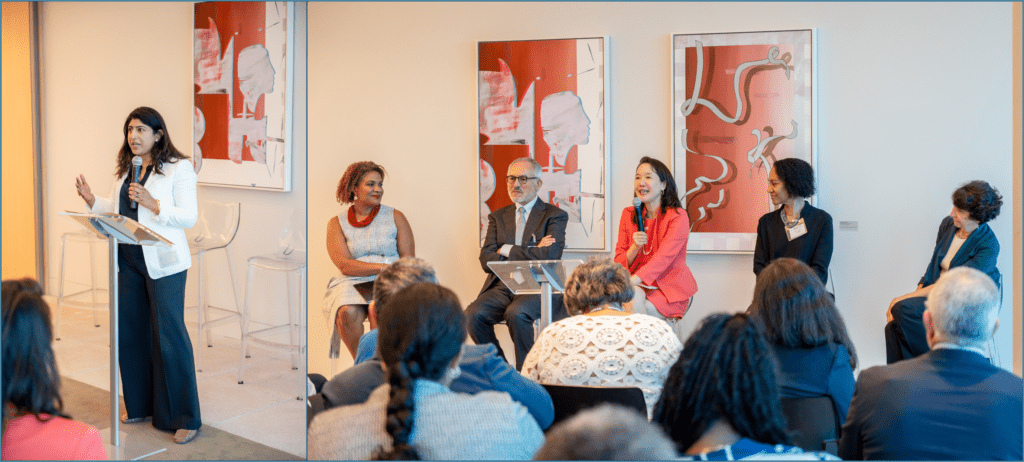
Panelists discussed six decades of the EEOC’s impact and the continuing importance of its mandate to advance equal opportunity for all.
At a program Outten & Golden LLP co-hosted with leading civil rights organizations to celebrate the Equal Employment Opportunity Commission’s (EEOC) 60th anniversary, current and former officials of the civil rights agency said the fight against workplace discrimination is as critical today as the day it was founded.
Commissioner Kalpana Kotagal said the passage of the Civil Rights Act of 1964, which created the EEOC, was a defining achievement of the civil rights movement. But the work it set in motion remains unfinished.
“Those who fought for passage of that law, they didn’t see it as a solution to bigotry. They didn’t expect it to end discrimination overnight,” she said. “Rather, it was one step in the larger and unending fight for civil rights and for the dignity of all people.”
Since the EEOC opened its doors in 1965, its mission has expanded to include new civil rights laws such as the Age Discrimination in Employment Act, the Americans with Disabilities Act, and the Pregnant Workers Fairness Act, Kotagal said.
Jenny R. Yang, a partner at Outten & Golden and a former EEOC chair, said the most important issue on her mind has been how to bring America together around a vision for equality and the understanding that the country is big enough for everyone to succeed.
Racial equality has always been hard for the country, Yang said. She was nominated by former President Barack Obama, whose election shifted some perspectives, she said.
”Many people thought we were in a post-racial society,” she said. “Our biggest challenge at the time was getting people to understand that discrimination still exists in America.”
After George Floyd was murdered by police in 2020, a new racial reckoning took hold, she said. The path hasn’t been linear or easy, but grappling with it is vital for advancing equality.
“My hope is that we are wrestling with who we are as a nation and where we need to go,” she said.
Yang spoke in a fireside chat with other former commissioners including former Chair Charlotte Burrows, former Vice Chair Jocelyn Samuels, and former Commissioner Fred W. Alvarez. Fatima Goss Graves, president and CEO of the National Women’s Law Center, moderated the discussion.
Following the commissioners’ session, a group of former EEOC general counsels took the stage.
Former general counsel David Lopez said the EEOC and the civil rights movement came after the gutting of reconstruction-era constitutional amendments by the Supreme Court, a wave of racial terrorism, and the rise of the color line – the racial segregation that existed after the abolition of slavery. That history laid the EEOC’s foundation and guides its staff.
“There’s always a periodic check and a question: what are we doing with respect to anti-Black racism?” he said. “Where are we in terms of the core legacy of this agency?”
Looking to the future, former general counsel Karla Gilbride said the pandemic demonstrated how using technology at work can open up possibilities, but cautioned that it may open the door to bias if left unchecked. Communication tools like video conferencing and social media are just some of the types of workplace innovations that the EEOC will have to confront as it upholds its mission.
“It’s not that we necessarily need new tools,” she said. “But we have to think creatively about how to apply the tools that we have, the laws that we have, to the continually changing landscape of the workplace.”
Former general counsel Eric Dreiband rounded out the panel. Jocelyn Frye, president of the National Partnership for Women & Families, moderated the discussion.
The commissioners and general counsels were appointed by Republican and Democratic presidents going back to President Reagan, underscoring that a commitment to civil rights has long been a bipartisan national commitment.
Joining Outten & Golden as co-hosts were AARP Foundation, Asian Americans Advancing Justice, Equal Rights Advocates, LatinoJustice, Lawyers’ Committee for Civil Rights Under Law, Leadership Conference on Civil and Human Rights, NAACP Legal Defense & Educational Fund, the National Employment Law Project, National Partnership for Women & Families, National Women’s Law Center, Public Citizen, and Public Interest Law Center.
The program brought together leaders from across the civil rights community to reflect on the agency’s legacy and the work ahead. Among the many guests in attendance were EEOC Acting Chair Andrea Lucas and Acting General Counsel Andrew Rogers.
As the EEOC enters its next chapter, Outten & Golden remains committed to defending the rights the agency was created to protect.

